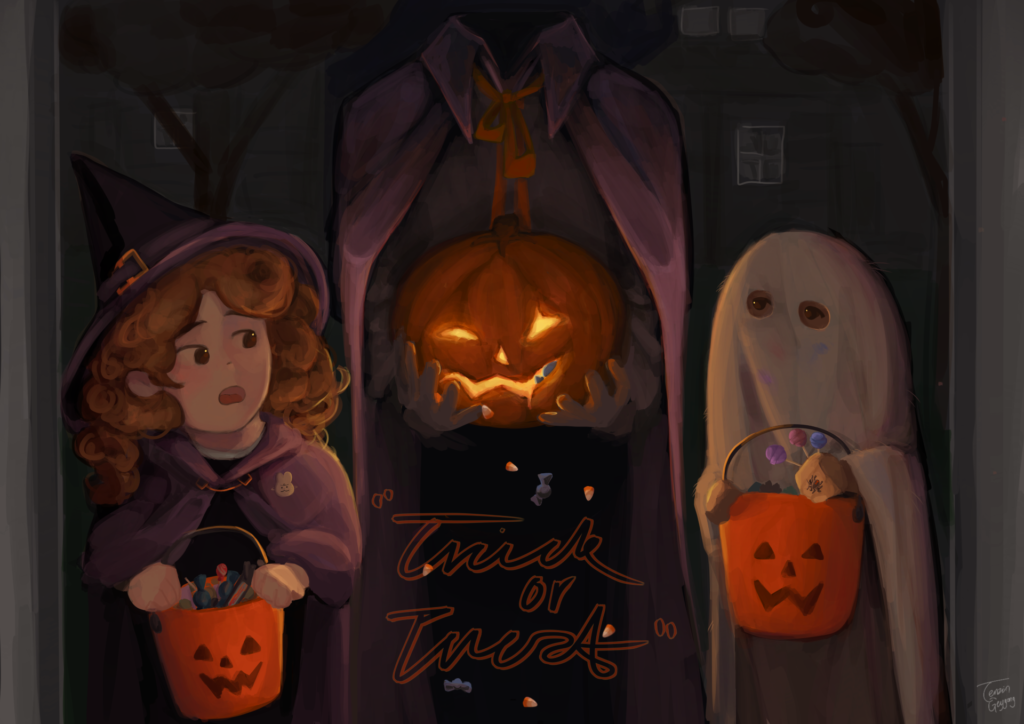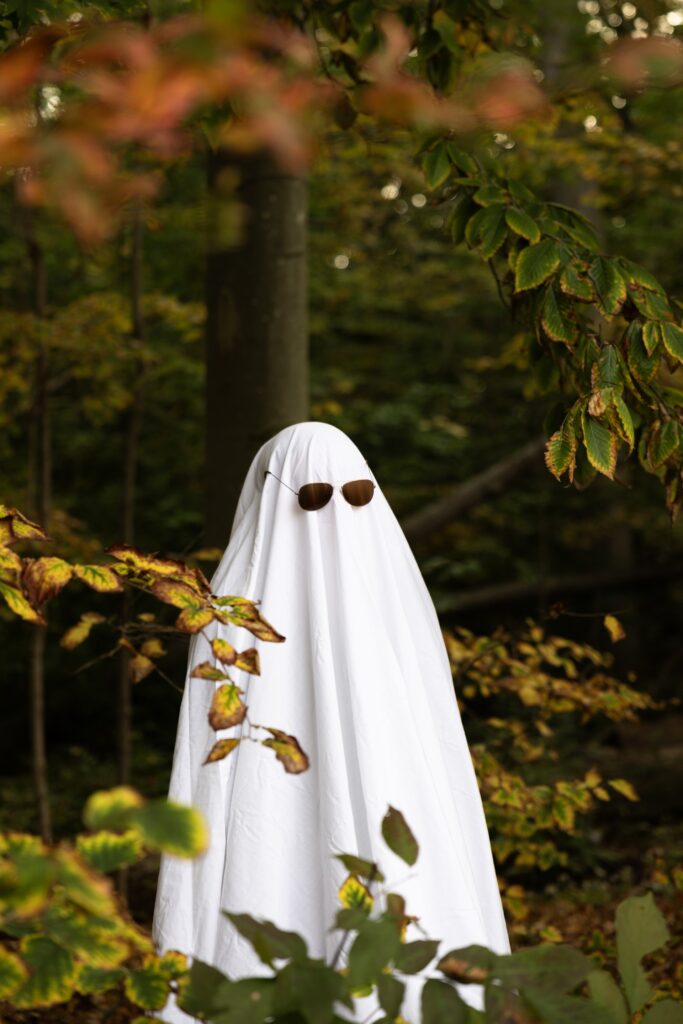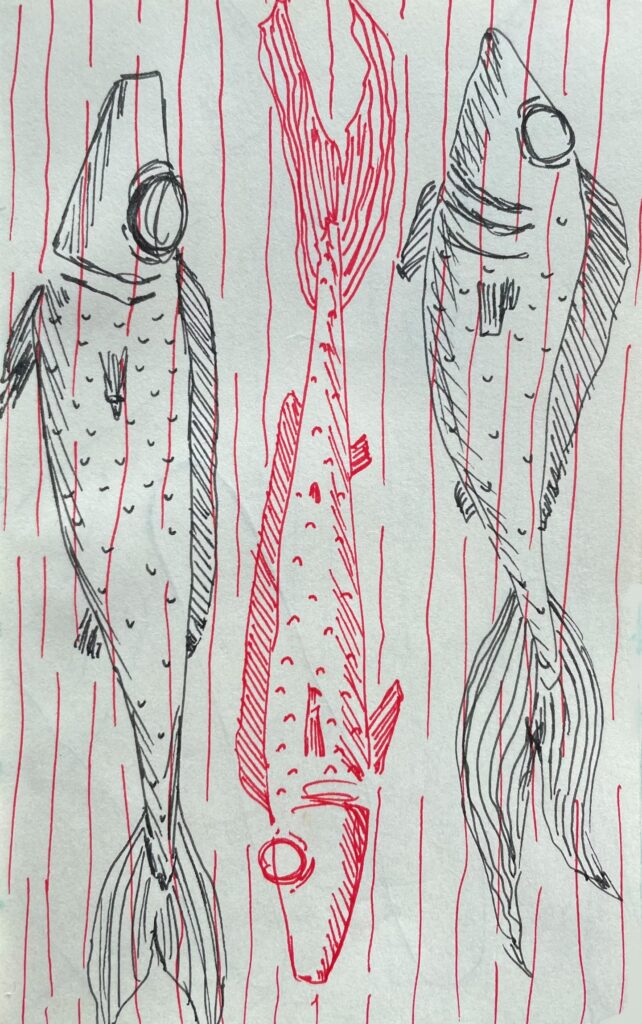Me, Myself, and I Make Five by Naomi Sheely
The room wraps me in its unrelenting chill, its sterile atmosphere amplifying my unease as I cling to the unforgiving chair. I make every effort to conceal my discomfort, determined not to give in to the growing unease that threatens to overtake me. Instead, I wrench my attention back to the man before me, ignoring the clammy sweat that beads on my palms as his gaze pierces through me. He smiles. Yet it doesn’t soften the blow, it only serves to deepen the disquiet settling within me. It’s a strained, unsettling expression, far from comforting.
“Do they have faces?” he asks with his pen hovering over his notepad, waiting. Ready.
“No,” I answer, my voice barely a whisper in the frigid room.
A heavy silence hangs in the air as his refusal to speak mirrors my unwillingness to continue. There is a deafening absence of a clock’s reassuring tick, no steady rhythm to measure the relentless march of seconds. Yet, I perceive the weight of each passing moment, as if they bear down on me, leaving no room for escape. A suffocating pressure claws at my chest, each breath feeling like a struggle for air. The silence is too heavy. My finger twitches involuntarily, tapping the table with a quick, almost imperceptible sound. His sharp gaze, akin to a cat locking onto its cornered prey, seizes on the subtle movement.
“Not usually, anyway,” I correct, my voice holding a note of vulnerability. “But sometimes, when I’m tired or the walls I’ve built in my mind are weak,” I pause, drawing a deep breath before continuing, “ones with faces slip through. But they don’t look normal, like you or me. No, they’re …terrifying.”
“Terrifying how?” he pushes, his fervent curiosity unwavering.
I think his smile is meant to be reassuring, yet it feels colder than the room itself. Memories of my mother’s solemn warnings flood my mind, her voice echoing through the years, cautioning me against ever revealing the unsettling truth of the demons that seem to exist only within my reality.
But she’s gone now, and I can no longer bear to confront these horrors alone.
“They’re… un-unnatural,” I stammer, my voice trembling and barely audible. My throat tightens, choked by the words needed to describe their grotesque features. I’m unable to describe how their eyes bulge hideously from their sockets, their limbs stretching to nightmarish lengths. These evils that haunt me through the day are things of true nightmares.
He doesn’t press me to describe them further, though. Instead, his continuous smile expands, stretching wider and wider until it seems impossibly large, like a grotesque caricature.
A shiver runs down my spine, raising the hair on the back of my arms, as an eerie, prickling chill overtakes me. It’s as if my body has locked into survival mode, instinctively recognizing a threat in the doctor’s demeanor. I silently plead with myself to act normal, to break free from his stare, but despite my efforts, I find myself unable to tear my eyes away from his increasingly manic expression.
My attempts at composure fail miserably, and his wide eyes shift to lock onto my forearms with an unsettling knowingness. His mouth stretches even further, and his gaze flicks back to mine, and I can see excitement and anticipation gleaming in his unnaturally prominent eyes.
The room is shrouded in an oppressive silence, the weight of his anticipation hanging in the air like an ominous storm about to break. It’s as though he’s waiting for something, something that I can’t quite comprehend. What truth does he possess that remains just beyond my grasp?
Without breaking our locked gaze, he slowly lowers his notepad onto the table.
Tick. Tick. Tick. The seconds drag on, each one a deafening echo in the room, a relentless reminder of the tension that engulfs us. Three seconds. Five seconds. It feels like an eternity.
His eyes finally release mine, their intensity shifting downward to the pen he still clutches tightly in his emancipated fingers.
My eyes involuntarily follow.
His grip on the pen is almost inhuman, his fist wrapped around it so tightly that his knuckles have turned an eerie shade of black. And then, with a speed that defies all reason, he reaches across the table and seizes my arm.
The thunderous rhythm of my heart fills the room, its frantic beat a stark contrast to the thrill that dances in the depths of the doctor’s unnaturally wide eyes. In that moment, I’m rendered speechless and paralyzed by fear. I can’t scream. I can’t think. I can’t even draw a breath.
I slam my eyes shut, reaching deep, desperately searching for any shreds of mental barriers that might shield me from this nightmarish ordeal. Desperation fuels my struggle, and every second feels like an excruciating battle against the relentless assault of a demon.
As I fight to maintain control, something shifts. The steady ticking of the clock, which had once echoed so loudly in the room, ceases. The sensation of his sharp nails biting into my skin begins to fade, but the memory of that terrifying grip still sits in the back of my mind like a haunting refrain.
I continue to build those mental walls, higher and higher, blocking out the outside world. My chest burns from the moments when I’ve forgotten to breathe, but I can’t afford to falter now. I’m exhausted, drained by the relentless battle raging within me.
Then, like a beacon of hope, there’s a knock at the door, followed closely by the soft scraping sound of its opening.
Still, I don’t dare to open my eyes. Not yet. I squeeze them almost painfully shut, offering a silent prayer to whatever forces might be listening. Just this once, please let it be over.
Each moment that passes feels like an eternity, and the oppressive silence becomes unbearable. Finally, unable to endure it any longer, my eyes snap open, their desperate gaze fixating on the open door.
In the doorway stands a gentle-looking woman, dressed in a warm cream sweater with her hair neatly tied back. She balances a clipboard and an open file, seemingly engrossed in reviewing the contents for our appointment.
With a loud exhale, I release the tension that had constricted my chest for what felt like an eternity. For once, it seems, my prayers were not in vain.
I wait patiently for her to look up from her clipboard. Then tentatively smile at her in welcome, in relief.
She smiles back at me, her grin a little wider than I had expected. The strained stretch of her lips causes an unsettling familiarity to wash over me, sending a shiver down my spine.
Unexpectedly, she winks at me with one of her deep-set, dark eyes, that seem slightly too large for her face.
“Welcome to Oak Meadow Psychiatric Hospital,” she says in a voice that isn’t quite soothing. “Don’t be nervous. I just know that once you settle in, you’ll never want to leave.” Her words hang in the air, heavy with promise.
—
Naomi Sheely thrives somewhere in chaos and caffeine. This has led her to the Dean’s list and literary publications at HCC, all while completing a double major and several all-night study sessions. It has, somehow, also given her a steady and calm husband and a well-behaved dog. Predictably, though, her three children are feral. There is no free time for hobbies, only the sweet escape of the written word.



